The Champ marks the third time in a row — after John Wayne and Burt Reynolds — that I’ve chosen a movie starring an actor many deride as a “natural,” a “ham,” someone who gained stardom not by skill but mere charisma. The sort of rough-hewn appeal epitomized by Wallace Beery (1885–1949) isn’t something that can be taught by Stanislavski or faked with The Method. It comes from within, and evokes American qualities and ideals that have never gone out of style.
Beery was born and raised in Kansas City, Missouri, the youngest son of three. He dropped out of school in fourth grade (“I was too dumb to get any farther”) and ran away for a few months, bumming around the Midwest, spurred onward not by a hatred of family but by a sense of pure adventure. At sixteen he lied his way into a job as an elephant handler with a circus, spending the next three years traveling across the country, and even crediting himself with being the first to train elephants to use their trunks to grab the tails of the elephants in front of them in order to keep them all in line. But eventually he realized that, where bull handling was concerned, “my ambition had been no ambition at all, that I was just drifting.” When Beery heard that his older brother Noah was working on Broadway in New York, he hurried there to try his hand at the acting game.
He first got a job in a stage chorus, singing and dancing. “Chorus men wore tights and frills,” Beery remembered with disgust, “and carried pink wands with ribbons on them, and made thorough asses of themselves. I didn’t like it, but it was the place to start. . .with a straw hat, cane and everything, including rouge cheeks and lips, I sang for a couple of years.” He also took whatever parts he could find in various stock companies, playing dramatic roles, villains, comedy — anything. Stock companies, he would later opine, “are the greatest training schools in the world for actors.”
In 1913 he went to Chicago and joined Essanay Studios, then-home of Charlie Chaplin. Beery made his name playing Sweedie, a maid (in drag!) always engaged in pie-throwing style hi-jinks. It was also there that he met his first wife, the future silent-film superstar Gloria Swanson. Beery later reminisced that
Gloria was about sixteen and the nearest thing to an angel that this elephant trainer had ever seen. I feel in love with Gloria at once, but I was twenty-seven and felt old enough to be her father. She liked me and we got along splendidly, and I did all I could to help her. To her I was a big motion picture star, just what she wanted to be. . . My salary was $125 a week, and I had a yellow speedster that was hot stuff. I think Gloria looked at the yellow paint instead of at me.
A two-year marriage ended with Swanson running off to other beaus who might further help her career (she would eventually marry seven times). “For a year I was entirely worthless,” Beery said later. “In the meantime I had got an uncontested divorce from Gloria on the grounds of desertion.” As his ex-wife quickly grew into one of the great stars of the silent era, he saw his own career fading away.
It was the opportunity to play villainous World War I roles that reignited his career. He played sadistic German officers both in The Unpardonable Sin (1919 — notable for featuring Rudolph Valentino’s first starring role) and in The Four Horsemen of the Apocalypse (1921). About the former film he said, “I put inside the part all of the hatred against the world that had been piling up inside me for a year,” and in the latter, audiences gasped as his character blithely munched on an apple while directing the slaughter of scores of women and children. Beery’s performances were judged “screen masterpieces” at the time by critics, with breathless newspaper articles boasting that “Beery fairly lives on the hisses of the crowd.”
These roles, and the multi-faceted ones that followed, propelled him through the rest of the decade as one of the top stars of the silent era. The 1920s were good to Beery. Now in his thirties, he was in his prime as an actor. In 1924 he remarried, to an actress named Rita Gilman, and would eventually adopt (and cherish for the rest of his life) the orphaned daughter of one of his wife’s relatives. He bought a beautiful Spanish-style home in Beverly Hills, branched out into a successful new comedy series, won accolades in now-classic films such as Robin Hood (1922), The Sea Hawk (1924), and The Lost World (1925), and became an accomplished pilot. By the end of the decade, books and magazines about Hollywood were hailing him as “one of the screen’s greatest actors.”
But those same publications were also delving into his personal life, and more often than not they were startled by the lack of pretension they found therein. Arriving at his home, reporters inevitably found him garbed in “an old sweat shirt” and “flannel trousers that had been pawed by his dogs.” One noted that, “Beery, happy-go-lucky and downright homely, is careless of his grammar, swears freely, prefers his new Ford to his two Lincolns, loves his beautiful home and his wife, the lovely Greta Gilman, and has no social ambitions.” When asked about their jobs, most actors are wont to give a long spiel about high Art, but Beery would just shrug and say, “To me pictures are merely a means of making a good living along the path of least resistance.” Whereas other actors bragged about their yachts and art collections and jewelry, Beery would admit, “Me, I like huntin’ and fishin’ and the simple life.”
With his Hollywood money he bought a series of hideaways in distant mountain locations: a cabin in Jackson Hole, Wyoming; an isolated lodge on a lake in the High Sierras of California; and ranches in Idaho, Utah, and Arizona. Having become certified as a pilot (going so far as to earn a aerial commission as a Lieutenant Commander in the U.S. Naval Reserve), he logged thousands of hours flying to these remote vacation spots, where he would spend weeks out in the woods or on the water, far away from Hollywood, communing with the natural world. In a town where image is everything, many glitzy stars mocked Beery as a simpleton and an unmannered boor, but Beery seldom gave a damn what anyone else thought of him. “Maybe I do look like a bum,” he said,
but I have lots of fun. . . Vacation time to me means an opportunity to get away from civilization and rough it. I would rather spend one week knocking around my cabin at Silver Lake than a month visiting the famous spas or other resorts of Europe, and when summer rolls around I feel my fingers itching for a fishing rod or one of my game rifles.
As it happened, 1929 was an awful year for Beery. The “talkies” hit Tinseltown like a tsunami, and overnight scores of longstanding stars found their jobs in mortal jeopardy. Beery ruefully remembered how, “A horde of elocutionists were brought from New York to the studios, and they were the people who decided whether you were out or in. They made a test of my voice and said it wouldn’t do. I was, they said, a silent actor.” Finished, just like that. Try as he might, he couldn’t get new roles. Days, weeks, and months passed with him hanging out at M-G-M every day, waiting for a single break and getting nowhere. At the same time, the stock market crashed, taking Beery’s $750,000 in securities and bringing them down to zero. A further $165,000 was lost due to two bank failures. And to top it off, a faulty heater burned his beautiful Beverly Hills house to the ground.
In a few short months, he had gone from being one of Hollywood’s top actors to finding himself wiped out, a forty-five-year-old broke has-been.
It was while gloomily eating spaghetti in the M-G-M commissary one day that he was spied by ace screenwriter Frances Marion, who saw in the burly, ugly hulk and his sloppy table manners a certain unvarnished quality that she felt might be well put to use in a prison movie she was making called The Big House. An impassioned talk with M-G-M production head Irving Thalberg, and Marion had given Beery a new chance at breaking back into pictures. He made the most of it, playing “Machine Gun” Butch Schmidt with equal parts sadistic menace and pitiable loutishness. The role reminded audiences of Beery’s talent, and with his first Academy Award nomination all worries about his sub-par “talkie” voice vanished. Just like that, Marion had put his career back on track. In the following years she continued to write a series of parts specifically for him, star-making turns in Min and Bill (1930), The Secret Six (1931), and finally The Champ.
In hindsight, The Champ took fuller advantage of Beery’s personality than anything that had come before. His Andy Purcell remains one of the most sympathetically flawed characters ever put on-screen — a self-destructive alcoholic and gambler who, thanks to Beery, never comes close to leaving the audience’s good graces. In a way, his character epitomizes the entire era of The Great Depression, that peculiar mixture of raw hope and monumental failure that defined a generation. The movie allows Beery to veer effortlessly from raucous laughs (in the lighthearted scenes with little Jackie Cooper) to horror (as when he punches his bloody fist into a jail-cell wall over and over) to abject tears (the famous ending, of course, but also several other memorable scenes).
While Frances Marion wrote the script, it was Beery’s performance that brought it to such startling, natural life — the smiles, the physicality, the mugging, the hesitations. And, above all, that natural charisma that simply can’t be taught. “You must understand life,” Beery insisted when asked how he managed to nail such roles. “You must have received some of its hard knocks, as well as a few of its benefits and enjoyments. Otherwise one cannot attain any depth of emotion, or carry conviction to the part. The fact that I have gone through the mill of experience is what has let me get by as a character actor.”
The Champ gave Beery his second Academy Award nomination, and when the ballots came in he had lost to Fredric March’s acting in Dr. Jekyll and Mr. Hyde by a single vote. The Academy promptly declared a tie and gave both men an Oscar, a decision eliciting cheers at the ceremony but also some grumbling among the rank-and-file. It’s hard to argue that Beery wasn’t as fully deserving of the award as March was, especially since Beery earned his with a very human and unadorned performance that didn’t rely on fancy makeup or effects.
In the wake of The Champ, Wallace Beery became not just successful but an enormous star, and would spend the rest of his life as a sort of American treasure. Yet to the end he stayed as unpretentious as ever. “I have no art in my soul,” he said in a 1940s interview, “except on Saturday night, when I draw a paycheck.” When Beery died in 1949, the news caused nationwide mourning. A writer at The Detroit Michigan News concluded: “No other Hollywood career provided more amusement and innocent satisfaction than that of the lumbering moose of a man that at one time or another in the last 38 years touched every heartstring in the beholder.” The Muncie Indiana Star added that, “Beery managed to pack more emotional wallop into his roles than most of the carefully-trained products of the dramatic schools. He was truly a ‘natural.’ Now he has joined W. C. Fields and many another beloved performer whose names may mean little to today’s youngsters but who will never be forgotten by their elders.”
Next Saturday in For Conservative Movie Lovers, a look at the kid who set the bar for all other child actors to come.
FURTHER READING and VIEWING
There is precious little about Wallace Beery on the Internet or in print. No biography, no documentaries — just isolated tales and rumors, usually centered around gossip concerning how much of a pain he was to work with. That charge is apparently accurate as far as it goes, but it takes two to tango, and a lot of the people he worked with were no angels themselves. Beery, for his part, comes across as surprisingly polite in the interviews he gave during his life, even when others (like ex-wife Gloria Swanson) were slyly dissing him. In any case, it should be remembered that he didn’t live long enough to hear and answer the various sniping stories about his on-set behavior, and so they should be read and interpreted in the context of a one-sided story.
A few more vicious rumors about Beery — that he raped his first wife, Gloria Swanson, on her wedding night, and fed her poison to abort the baby; that he beat Three Stooges creator Ted Healy to death at a Hollywood nightclub in 1937 and had M-G-M cover up his involvement — are, as far as I can discern, baseless slander promulgated decades after his death by people with a grudge and/or a penchant for Hollywood Babylon-style gossip. Don’t believe everything you read. . . .
Here’s a YouTube tribute video to Beery that someone posted, which offers a lot of rare pictures both from his movies and from his private life (such as him posing by his airplanes).
A blogger called the Mythical Monkey has a fine post on Beery’s star turn in The Big House, complete with some nice pictures.
Beery’s brother Noah Beery was also a popular character actor, although he never fully broke into the leading man A-list the way his brother did. And Noah’s son, Noah Beery Jr., followed in the family footsteps and became a noted actor in his own right (he’s most famous for playing James Garner’s pop in The Rockford Files).
“Reel Chicago” by Robert Loerzel in Chicago Magazine: a well-researched article about the old Essanay Studios where Wallace Beery got his start in movies, complete with lots of rare high-quality photographs.
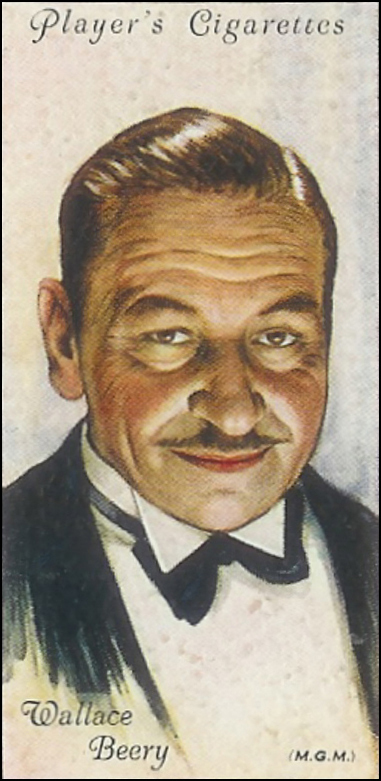
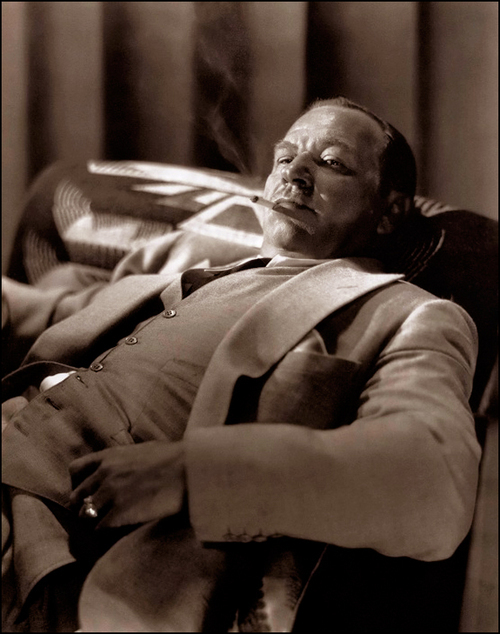
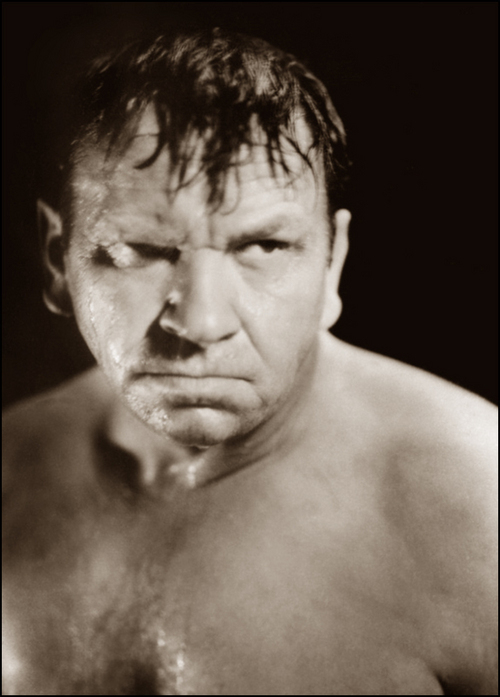
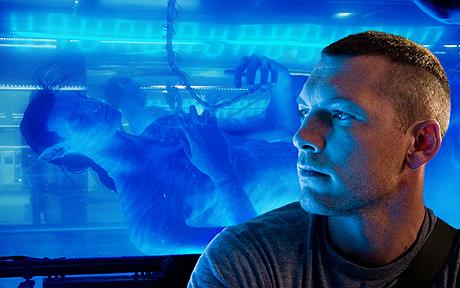
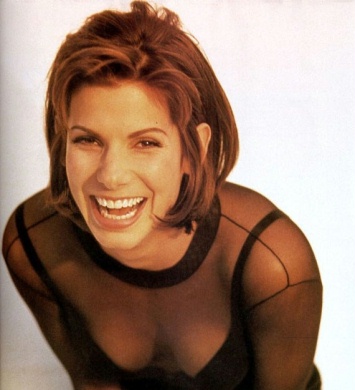
COMMENTS
Please let us know if you're having issues with commenting.